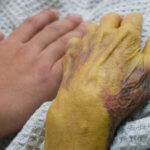
Cancer is a disease that occurs when cells within the body mutate and start beginning to grow at an uncontrollable rate. Virtually any cell in the body can become cancerous and can spread into other parts of the body.
Prostate cancer occurs when the cells located in the prostate gland grow out of control. This gland is specific to men and it is a vital part of the male reproductive system. The prostate produces a majority of the fluid that is found in semen, which houses sperm. This gland also filters out and removes toxins to protect sperm, aides in forming erections and controls the flow of urine. Prostate cancer can impact every function of this gland and without treatment, it can spread and eventually cause death.
Though the exact cause of prostate cancer is not known, there are certain risk factors that may increase the risk of developing it.
1. Family history
Of all the risk factors that are associated with developing prostate cancer, your genetics is the most significant. People who have a family history of this type of cancer are much more at risk of developing it than those who do not have a family history. This is particularly true if a close relative has been diagnosed with the disease, such as your father or your brother. Inherited genes can certainly play a role in the development of this type of cancer.
Men who have the BRCA2 gene are five times more likely to develop prostate cancer than men you do not possess this gene. The risk may be even higher for men who have the BRCA1 gene. If anyone in your family has had prostate cancer, having a regular exam can detect if there are any abnormalities in your prostate that could lead to cancer.


